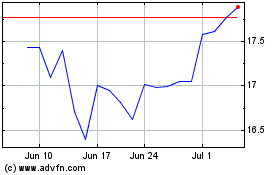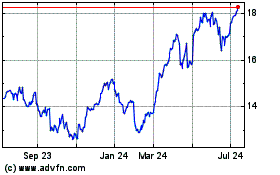Chinese Exports Post Biggest Decline Since 2009
January 13 2016 - 12:20AM
Dow Jones News
By Mark Magnier
BEIJING--Chinese exports declined for the year, marking their
worst performance since 2009, as weak demand continued to weigh on
the world's second-largest economy.
Exports, however, fell less than expected in December thanks to
a favorable comparison with year-earlier figures. The improved
monthly results don't signal a major recovery this year despite a
weaker yuan, economists said.
"In the next few months, the comparative price effect will fade
out and export growth will recover," ING Group economist Tim Condon
said. "But it's not going to be as strong as in 2013 or 2014."
According to the General Administration of Customs, China's
exports fell 1.4% in December in dollar terms from a year earlier,
after a drop of 6.8% in November. This was a more modest decline
than the 8.0% fall forecast by 15 economists surveyed by The Wall
Street Journal. In yuan terms, exports rose last month. Imports
last month fell 7.6% from a year earlier, compared with an 8.7%
decline in November.
The country's trade surplus widened to $60.1 billion in December
from $54.1 billion in November. Last year's weak Chinese exports
and even weaker imports led to a record $594.5 billion annual trade
surplus, compared with $382.5 billion in 2014, the agency said, as
full-year exports fell 2.8% and imports fell 14.1%.
Despite the decline in exports last year, the Asian giant
managed to increase its share of global trade.
"China's declining exports in 2015 were mainly due to sluggish
external demand on the back of slowing global economic recovery
since the financial crisis," Customs spokesman Huang Songping told
reporters Wednesday. "But China's export performance is better than
other major economies in the world."
Few economists see a huge export turnaround ahead, however, with
exports no longer as important for China as they used to be.
December's improved outbound data may reflect a one-time boost as
companies rushed to meet year-end orders. While business sentiment
in Germany picked up recently, confidence surveys in the U.S. have
weakened. And on the import side, domestic demand and global
commodity prices remain weak.
"Demand may not be a big driver," said Standard Chartered Bank
economist Ding Shuang.
Rong Zhaoxia, a saleswoman with Jiangmen, Guangdong-based
Bonanza Metalware Ltd., which sells stainless steel kitchenware to
Europe and Australia, said the company's export shipments fell in
2015 from 2014 levels, with the decline accelerating in the fourth
quarter. Despite tougher conditions, the company doesn't expect to
lay off any of its 200 or so workers, she said, although it may
lose some through attrition.
"The world economy is not good, and both Europe and Australia
are declining," she said. "Our contracts dropped in number terms
and our sales in 2015 declined over 2014."
Mr. Huang of the customs agency said Beijing will keep a close
eye on the yuan's movement. China has seen a significant
depreciation in the yuan in recent weeks as the central bank
introduces more flexibility into the currency trading system,
leading to a 1.5% depreciation over the past week--its sharpest
weekly decline since August. A depreciating currency tends to makes
exports less expensive when purchased overseas.
Shipping companies said the weaker yuan should spur outbound
trade flows. "Chinese exporters often tell us that with rising
costs in China, it is a battle to stay competitive
internationally," said Tim Smith, North Asia chief representative
with shipping company Maersk Group Ltd. "Export trade performance
was relatively weak in 2016, and anything that gives exports a
boost is welcome."
Ms. Rong said the yuan's recent slide isn't a huge factor for
her company, which generally fixes prices months in advance,
although it should provide more modest opportunity for discounting
moving forward. She said she expects the yuan to depreciate to
around 6.9 yuan to the dollar this year--it is currently trading
around 6.57--adding that she hopes the downward slide is gradual
since volatility tends to hurt their business.
While the International Monetary Fund recently said that China's
currency was fairly valued, China's large annual surplus could
become a U.S. political issue this year, particularly if Republican
presidential candidate Donald Trump does well, economists said.
"He's already lashed out and said we're losing everything to
China," said ING's Mr. Condon. "If he's the Republican presidential
candidate, I suspect there will be more saber rattling on
that."
Grace Zhu and Liyan Qi contributed to this article.
Write to Mark Magnier at mark.magnier@wsj.com
(END) Dow Jones Newswires
January 13, 2016 00:05 ET (05:05 GMT)
Copyright (c) 2016 Dow Jones & Company, Inc.
ING Groep NV (NYSE:ING)
Historical Stock Chart
From Mar 2024 to Apr 2024

ING Groep NV (NYSE:ING)
Historical Stock Chart
From Apr 2023 to Apr 2024
